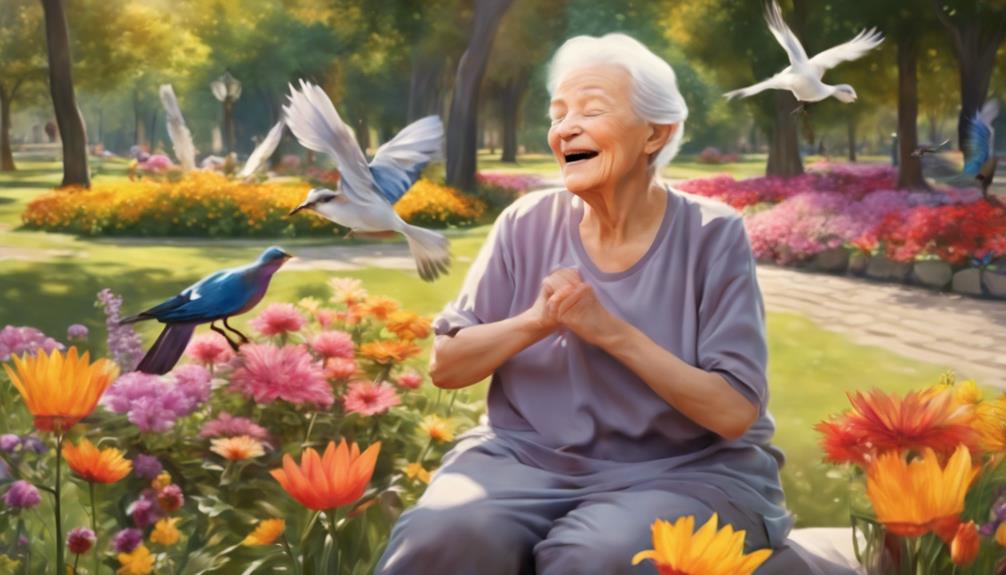Let’s involve and amuse dementia patients with seven activity suggestions. Consider trying gardening therapy for relaxation and cognitive function. Appreciate music to help decrease agitation and encourage communication. Engage in arts and crafts for self-expression and mood improvement. Incorporate light physical exercises to enhance mobility and mood. Dive into memory lane reminiscence to evoke vivid memories and emotional connections. Remember to include sensory stimulation for a multisensory experience. Additionally, interactive storytelling can help trigger memory recollection and stimulate social interaction. These activities are beneficial for cognitive function, emotional well-being, and social involvement. Explore more ways to support dementia patients by participating in these enriching activities.
Key Takeaways
- Gardening therapy for relaxation, sensory stimulation, and cognitive enhancement.
- Music appreciation to reduce agitation, improve mood, and stimulate communication.
- Creative arts and crafts for self-expression, cognitive stimulation, and social interaction.
- Light physical exercises for mobility, relaxation, and mood enhancement.
- Memory lane reminiscence to enhance cognitive function, emotional connections, and memory recall.
Gardening Therapy
Have you ever wondered how gardening therapy positively impacts individuals with dementia? Engaging in gardening activities can be incredibly beneficial for those with dementia. Gardening therapy provides a unique opportunity for individuals to participate in meaningful activities that promote relaxation, sensory stimulation, and cognitive function. The act of tending to plants and being in nature can notably improve mood, reduce stress levels, and increase physical activity, all of which are essential for individuals with dementia.
Research has shown that gardening therapy can enhance memory retention and cognitive abilities in individuals with dementia. The sense of purpose and accomplishment that comes from caring for plants and seeing them thrive can be incredibly rewarding for dementia patients. This form of horticultural therapy has become increasingly popular in memory care settings due to its numerous benefits for individuals with dementia.
Music Appreciation

Engaging in music activities with individuals with dementia has been proven to reduce agitation, improve mood, and enhance cognitive function. Music therapy is a powerful tool that can evoke memories, stimulate communication, and promote social interaction among dementia patients.
Here are three ways to incorporate music appreciation into your activities with seniors:
- Personalized Playlist: Create personalized playlists for each individual based on their favorite songs and genres. Playing familiar music can trigger positive emotions and memories, leading to improved mood and cognitive function.
- Group Sing-Alongs: Organize group sing-alongs or music sessions where seniors can participate in singing or playing simple instruments. This fosters social interaction, a sense of community, and belonging among individuals with dementia.
- Music Discussion Groups: Facilitate discussions about different genres, artists, or songs to encourage cognitive engagement and social interaction. This activity can help seniors with dementia stay connected and engaged with others through shared musical experiences.
Creative Arts and Crafts
Exploring creative arts and crafts offers dementia patients a valuable outlet for self-expression and cognitive stimulation. Engaging in activities like painting, drawing, and crafting can improve cognitive skills and provide a sense of accomplishment. These creative endeavors stimulate creativity and self-expression, allowing individuals with dementia to express themselves in unique ways.
Crafting activities not only boost cognitive function but also provide sensory stimulation, enhancing mood and reducing anxiety. Additionally, participating in arts and crafts projects can promote relaxation and foster social interaction among dementia patients in a supportive environment.
Through these activities, individuals can enhance their hand-eye coordination and fine motor skills, leading to a sense of achievement and fulfillment. Encouraging dementia patients to engage in creative arts and crafts can have a positive impact on their overall well-being and quality of life.
Light Physical Exercises

Exploring light physical exercises can be beneficial for dementia patients at home by enhancing mobility and circulation. Engaging in these activities not only supports physical well-being but also contributes to overall quality of life.
Here are three simple and effective light physical exercise ideas tailored for dementia patients:
- Chair Yoga: Gentle yoga poses modified to be done while sitting on a chair can help improve flexibility, strength, and relaxation. Encouraging slow and mindful movements can enhance mood and reduce agitation, promoting a sense of calmness and well-being.
- Stretching Exercises: Incorporating gentle stretches for the arms, legs, and back can help maintain muscle tone and flexibility. These movements can also improve circulation, reducing the risk of stiffness and promoting better blood flow throughout the body.
- Seated Dances: Enjoying music and engaging in simple seated dance routines can elevate energy levels and enhance mood. Movement to music can stimulate memory and emotions, providing a joyful and stimulating experience for dementia patients.
Memory Lane Reminiscence
Memory Lane journeys are like taking a stroll down memory lane, recalling happy moments and treasured experiences.
Nostalgic object showcases can include items like old toys, vintage books, or antique household items, sparking vivid memories and stories.
Memory Lane Journeys
Through reminiscence activities like Memory Lane Journeys, individuals with dementia can reconnect with cherished memories, enhancing cognitive function and emotional well-being. Our goal is to create a meaningful experience tailored to each person's interests and abilities.
Here are three engaging ideas for Memory Lane Journeys:
- Photo Albums: Looking through old photo albums can spark conversations and help individuals reminisce about significant life events and loved ones.
- Classic Movie Nights: Watching timeless films can transport individuals back in time, triggering memories associated with the movie's era and storyline.
- Music Sessions: Listening to familiar songs from the past can evoke strong emotions and memories, encouraging individuals to share personal stories related to the music.
These activities aim to promote cognitive stimulation and emotional connections in a comforting and supportive environment.
Nostalgic Object Showcases
Creating showcases of nostalgic objects allows us to curate meaningful displays that trigger memories and stimulate connections for individuals with dementia.
These memory lane reminiscence activities involve setting up exhibits with personal artifacts like old photographs, cherished trinkets, or mementos tied to past hobbies or professions.
By incorporating visual and tactile stimulation, these showcases provide a familiar and engaging environment for those with dementia, encouraging reminiscing and storytelling.
Utilizing personal items in these displays helps evoke emotions, spark conversations, and enhance cognitive stimulation.
Nostalgic object showcases not only offer a trip down memory lane but also create a space where individuals can reconnect with their past experiences, fostering a sense of comfort and belonging in their present reality.
Sensory Stimulation Activities

Engaging the senses through various activities can greatly benefit individuals with dementia by triggering memories and enhancing cognitive function. Here are three sensory stimulation activities that can be particularly helpful:
- Texture Activities: Providing materials like silk, burlap, wool, and linen for individuals to feel can offer sensory stimulation that triggers memories and enhances cognitive function. Exploring different textures can be a soothing and engaging experience for dementia patients.
- Fish Keeping: Setting up a small fish tank can be a wonderful sensory activity. From feeding the fish to cleaning the tank, this activity provides opportunities for sensory experiences that can improve cognitive function in individuals with dementia.
- Karaoke: Singing along to familiar songs can be a fun and stimulating sensory activity that may help improve memory recall in dementia patients. Music has a powerful way of evoking memories and emotions, making karaoke a great choice for engaging individuals with dementia.
Interactive Storytelling

Let's craft stories together as a way to stimulate memory recall and promote social interaction among individuals with dementia. Interactive storytelling involves engaging dementia patients in creating stories using prompts or pictures. This activity can stimulate memory recall, promote creativity, and encourage social interaction. By using props or memory aids during storytelling, we can make the experience more interactive and enjoyable for everyone involved.
Here is a table highlighting the benefits of interactive storytelling for individuals with dementia:
| Benefits of Interactive Storytelling |
|---|
| Stimulates memory recall |
| Promotes social interaction |
| Enhances creativity |
| Improves communication skills |
| Fosters emotional connections |
Interactive storytelling can be adapted to different cognitive levels and interests, making it a versatile and engaging activity for dementia patients. Try incorporating this activity into your caregiving routine to provide a stimulating and enjoyable experience for your loved ones.
Frequently Asked Questions
How Do You Keep Dementia Patients Entertained?
We keep dementia patients entertained with engaging activities that stimulate their senses, trigger memories, and promote social interaction. Our goal is to provide comfort and joy through familiar scents, objects, and group activities that evoke positive emotions.
What Are Meaningful Engagement Activities for Dementia Patients?
We find that tailoring activities to seniors' interests and abilities is key. Engaging in reminiscence activities, sensory experiences, and simple tasks can reduce frustration, evoke positive responses, and improve cognitive function in dementia patients.
What Are Creative Activities for Adults With Dementia?
We embrace creativity for adults with dementia. Painting, music, crafts, and sensory experiences bring joy. Tailoring activities to interests lessens frustration and enhances life quality. Engage in meaningful activities for cognitive stimulation and emotional well-being.
What Table Activities Are Good for Dementia Patients?
Table activities like puzzles, card games, and sorting tasks benefit dementia patients by stimulating cognition and promoting focus and memory. Engaging in these activities can provide a sense of accomplishment and social interaction, tailored to individual interests. Additionally, these activities can help maintain fine motor skills and hand-eye coordination, which are important for daily functioning. For those seeking variety, incorporating technology can be beneficial; for example, exploring the best Wii games for brain fitness offers an interactive and enjoyable way to further enhance cognitive exercises. This combination of traditional and modern methods ensures a well-rounded approach to mental stimulation in dementia patients.
Conclusion
To sum up, engaging in activities with loved ones living with dementia is like planting seeds of joy and connection.
By exploring the power of music, creativity, movement, memory, sensory experiences, and storytelling, we can cultivate a garden of shared moments that bloom with happiness and engagement.
These activities serve as tools to nurture the mind and spirit, fostering a sense of belonging and purpose in the journey of dementia care.









